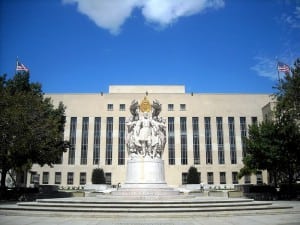litigation
-
Legal & Regulatory
The Courtroom Risk No One in Power Generation Can Afford to Ignore
In an industry grappling with decarbonization mandates, volatile energy markets, and supply chain uncertainty, another threat has quietly emerged with the power to upend everything: the courtroom. Mega verdicts—jury awards exceeding $10 million—are not new. But the scale, frequency, and unpredictability of these rulings are escalating. According to a 2025 corporate verdicts report published by […]
-
Commentary
Powering the Future Without Paralyzing It
The future of energy is rapidly evolving. The explosion of artificial intelligence (AI) and the enormous energy infrastructure it demands will continue to drive unprecedented electricity needs. Goldman Sachs projects that U.S. power demand could grow by as much as 20% by the decade’s end, in large part due to the construction of data centers. These […]
-
Legal & Regulatory
Supreme Court Showdown: EPA Defends Carbon Capture Amid Power Industry Backlash
The Environmental Protection Agency (EPA) has doubled down on its stance that carbon capture is “adequately demonstrated” in a brief filed with the U.S. Supreme Court as part of a bid to urge the high court to allow the agency’s contentious Carbon Pollution Standards to remain in effect while legal challenges continue. The Supreme Court […]
-
Legal & Regulatory
Federal Court Rejects Stay on EPA’s Carbon Pollution Standards in Setback for Power Industry
The U.S. Court of Appeals for the District of Columbia has denied motions to stay a suite of Environmental Protection Agency (EPA) regulations that champion carbon capture and storage (CCS) technology as a key pathway for reducing greenhouse gas emissions (GHGs) from fossil fuel-fired power plants. The rules face legal challenges from 24 states, eight […]
-
Legal & Regulatory
Litigation Is Not the Right Path for Climate Solutions
In late January, the U.S. Court of Appeals for the 4th Circuit in Richmond, Virginia, took up a case that could play an important role in deciding the future of climate change lawsuits in the U.S. The immediate issue is a dry question of procedure—the grounds for removal of a case from state court to federal court. But […]
-
Commentary
Filed Rate Doctrine: A Powerful Tool in Energy Litigation
The regulatory landscape for the energy industry has changed significantly in the past few decades, but a century-old Supreme Court canon—the filed rate doctrine—continues to be a valuable tool for
-
Legal & Regulatory
D.C. Circuit Halts Clean Power Plan, Mercury Rule Litigation
In two separate actions over the past 24 hours, the D.C. Circuit granted the Environmental Protection Agency’s (EPA’s) request to suspend cases challenging the Clean Power Plan and the Mercury and Air Toxics Standards (MATS). The orders are the latest in a series of similar actions over the past month by the D.C. Circuit that […]
-
Legal & Regulatory
Trump’s Regulatory Rollback May Hit Roadblocks
President Donald Trump’s drive to roll back federal regulations, especially from the Environmental Protection Agency (EPA), will not be simple or smooth, a veteran Washington, D.C., attorney said at a utility conference on February 8. Speaking at the Energy, Utility, and Environment Conference (EUEC) in San Diego, Calif., Thomas Lorenzen, a partner with D.C.–based law […]
-
Legal & Regulatory
EPA Motions Court for Weighty Changes to Final Coal Ash Rule
A recent motion filed by the Environmental Protection Agency (EPA) asking a federal court to remand parts of its final coal combustion residuals (CCR) rule could have major new consequences for the power sector if upheld, an expert has said. In its 16-page motion filed on April 18, the agency asked the U.S. Court of Appeals […]
-
Legal & Regulatory
Climate Change Litigation: Implications for States and Power Generators
Climate change litigation in the U.S. has far outpaced climate litigation in any other jurisdiction. In fact, according to Teri Donaldson, partner with DLA Piper, more lawsuits concerning climate change have been decided or settled in the U.S. than in the rest of the world combined. “The success rate in these cases is very low,” […]










